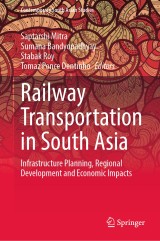Details

Railway Transportation in South Asia
Infrastructure Planning, Regional Development and Economic ImpactsContemporary South Asian Studies
|
CHF 189.00 |
|
| Verlag: | Springer |
| Format: | |
| Veröffentl.: | 20.08.2021 |
| ISBN/EAN: | 9783030768782 |
| Sprache: | englisch |
Dieses eBook enthält ein Wasserzeichen.
Beschreibungen
<p>This book discusses policy instruments for sustainable infrastructure developments. Railways are one of the most important developmental instruments of a region, province, or country. They play a crucial role in economic development, urban growth, urban mobility, regional susceptibility, market integration, and world trade. Railways are an integral part of regional and urban development, both in terms of freight and passenger transport. </p><p>By offering case studies from various regions and cities in South Asia, this book examines the evolution of railway transportation and the impact of these infrastructure projects on regional and urban development. It examines the interactions between evolving infrastructures and competing demands and considers the negative and positive externalities of railway transportation for people, places, and locations. The contributions analyze issues such as network infrastructure planning and technological development, passenger mobility andsatisfaction, vulnerability to environmental impacts, and cross-border trade. <br></p><p></p><p></p><p></p>
Introduction: Railway Transportation: Regions, Economy and Development.- Post-Industrial Revitalisation of Railway Stations: The Path to Commercialisation.- Portuguese Colonial Railways: Agents and Subjects of Railway Imperialism (1880-1915).- Impact of Metro-rail projects on Land use and Land value in Indian cities - The case of Chennai.- Commuting and Regional Patterns: A Study of the Oldest Suburban Railway Line of Eastern India.- Analysing Energy Efficiency of Rail and Road Transport in Pakistan with Data Envelopment Analysis.- Rail Freight Transport System in Tripura: An Analysis of Performances and Prospects.- India’s Public Transport Systems: Role of Metro Rail Systems.- Intermodality towards Enhancing Rail Freight Transportation Prospects.- Perceived Railway Service Quality Assessment: A Compendium of Literature Studies.- Role of Railways in Rural Development.- New or Renewed Kolkata, the Outcome of the Metro and Railway Network Designs.- Bangladesh-India Rail Connectivity: Foreseen Opportunities for Tourism.- Growth of Slums on Railway Land in Guwahati City, Assam: A Sociological Review.- Railway Modernisation in South Asia: A Case Study of India.- What Role for Railways in the Eurasian Supply Chains?.- The Role of Railway Transport System in Modern Multiscale Spatial Development. Bulgaria in the Orient Express.- Privatisation of Indian Railway Services: Story so far.
<p><b>Saptarshi Mitra</b> is Assistant Professor at the Department of Geography and Disaster Management of the University of Tripura in Agartala, India, Coordinator of the Regional Planning and Urban & Rural Development Laboratory, and Researcher on projects in the field of planning and development. <br></p>
<p><b>Sumana Bandyopadhyay</b> is Professor at the Department of Geography of University of Calcutta in India, specialized in Urban Geography, Regional and Environmental Planning. She is presently the President of the Indian Regional Science Association. Her present research areas are urban public space, neoliberal urban transformations, ecological resilience and urban heritage. Her publications are largely in the field of urban studies. <br></p>
<p><b>Stabak Roy</b> works as Doctoral Researcher at the Regional Planning and Urban & Rural Development Laboratory, Department of Geography and Disaster Management, Tripura University, India. Mr. Roy conducts research on Railway Geography, Railway Infrastructure Planning and Management, and Transport Planning and Tourism. <br></p>
<p><b>Tomaz P. Dentinho</b> is Professor of Regional, Environmental and Agriculture Economics at the University of Azores, Portugal, and is Director of the Regional Cooperation Research Programme at the South Asia Democratic Forum (SADF), a Brussels based think tank. Dr. Dentinho is also Editor-in-Chief of the Journal Regional Science Policy and Practice. <br></p>
<p><b>Sumana Bandyopadhyay</b> is Professor at the Department of Geography of University of Calcutta in India, specialized in Urban Geography, Regional and Environmental Planning. She is presently the President of the Indian Regional Science Association. Her present research areas are urban public space, neoliberal urban transformations, ecological resilience and urban heritage. Her publications are largely in the field of urban studies. <br></p>
<p><b>Stabak Roy</b> works as Doctoral Researcher at the Regional Planning and Urban & Rural Development Laboratory, Department of Geography and Disaster Management, Tripura University, India. Mr. Roy conducts research on Railway Geography, Railway Infrastructure Planning and Management, and Transport Planning and Tourism. <br></p>
<p><b>Tomaz P. Dentinho</b> is Professor of Regional, Environmental and Agriculture Economics at the University of Azores, Portugal, and is Director of the Regional Cooperation Research Programme at the South Asia Democratic Forum (SADF), a Brussels based think tank. Dr. Dentinho is also Editor-in-Chief of the Journal Regional Science Policy and Practice. <br></p>
<p>This book discusses policy instruments for sustainable infrastructure developments. Railways are one of the most important developmental instruments of a region, province, or country. They play a crucial role in economic development, urban growth, urban mobility, regional susceptibility, market integration, and world trade. Railways are an integral part of regional and urban development, both in terms of freight and passenger transport. </p>By offering case studies from various regions and cities in South Asia, this book examines the evolution of railway transportation and the impact of these infrastructure projects on regional and urban development. It examines the interactions between evolving infrastructures and competing demands and considers the negative and positive externalities of railway transportation for people, places, and locations. The contributions analyze issues such as network infrastructure planning and technological development, passenger mobilityand satisfaction, vulnerability to environmental impacts, and cross-border trade. <p></p>
Studies the evolution of railway transportation in South Asia Offers various country studies Highlights the impacts of these infrastructure projects on regional and urban development

















